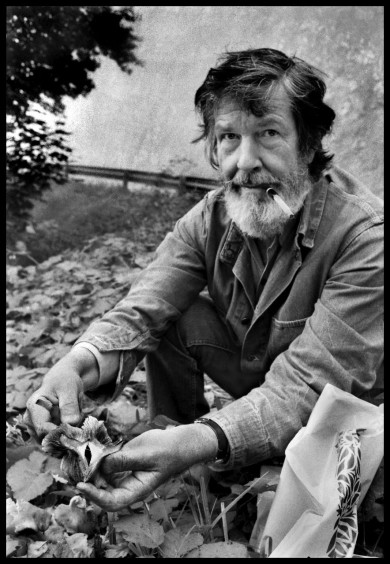New World Symphony’s Cage Festival presents wonderfully antic chaos with “Song Books”

John Cage’s “Cheap Imitation” and “Song Books” were performed Saturday night at the New World Symphony’s Cage Festival in Miami Beach.
Saturday night’s John Cage program—part of the New World Symphony’s celebration, which continues Sunday night—revealed a composer who communicated deep ideas in simple ways, with two richly diverse works: Cheap Imitation and Song Books.
Cheap Imitation allowed NWS to “embrace the work of Merce Cunningham,” Cage’s long-time partner and collaborator, according to the orchestra’s artistic director Michael Tilson Thomas. Cunningham’s desire to choreograph Erik Satie’s Socrate led Cage to transcribe it for piano performance. However, copyright issues denying its use forced Cage to radically transform the work, using chance operations to transpose each note, while preserving the structure. The resulting Cheap Imitation inspired Cage to create an orchestral version, wherein each musician contributes single notes to the ongoing melody.
Deceptively simple, Cheap Imitation is filled with treacherous attacks, balance and tuning challenges. The diatonic music, like Cunningham’s dance, is heroic and smooth, static fragments suspending time with graceful tranquility. The orchestra’s preparation was evident, as they traded off lines seamlessly, creating complex chains of color. Performing without a conductor, the musicians demonstrated keen ears and supreme control.
Movements I and III framed video footage of Cage himself performing the second movement on piano. Brandon Collwes and Andrea Weber recreated Cunningham’s original choreography, Second Hand, with breathtaking control.
The transcendently resonant third movement was best of all, with deepening silences expanding the timelessness, and new choreography by Rashaun Mitchell. Adam Larsen’s video of archival footage of Second Hand, with rainbow-hued dancers augmenting the duo on stage, held the audience rapt.
In Song Books, Cage used three questions to guide his composition of 90 different songs and theater pieces with electronics [“Is this solo relevant or irrelevant to the overall theme (We connect with Thoreau and Satie) of the Song Books?”; “What kind of solo is this (song, song using electronics, theater, or theater using electronics)”; and “How will I compose this solo? (previously used methods, new methods or a combination)”]. The wide-ranging results are presented simultaneously, as a happening.
Mature artistic interpretations of the works from classical stars like Jessye Norman, Meredith Monk, Joan La Barbara, Marc-André Hamelin, and Tilson Thomas invited entry into the work despite the antic overload.
The complex set-up included multiple performance stations, three house-shaped boxes with projection screens, and two pianos elevated on either side of the stage. Performers entered and exited constantly, moving among stations and improvising instrumentally and theatrically.
An element of play was underlined with dominoes, cards, chess and foosball. Balls were kicked, gifts bestowed. There were sandcastles, stones, butterfly nets, bicycles, beer, a baby carriage, a bare-breasted mannequin. The black flag of anarchy was flown, and a banana ate a banana.
Throughout, Norman’s dulcet voice elegantly wafted over the chaos. La Barbara’s vocal explorations sparked interest and Monk’s charismatic physicality commanded attention. Hamelin, performing Cage’s Winter Music with NWS’s Marnie Hauschildt, also indulged his theatrical side: scratching, eating, performing the silent, celebrated 4:33. As each singer reinterpreted the same song, profound expressions emerged, underscoring the performer’s importance within Cage’s frameworks.
The sheer impossibility of comprehending the whole event meant that, based on individual choices, each member of the audience was guaranteed a unique experience of Song Books. Making sense of the complex absurdity onstage pointed poignantly to the choices we make in life, and our opportunities to play.
A John Cage Tribute, the final concert of the NWS Cage Centennial Celebration, takes place 7:30 p.m. Sunday at the New World Center. nws.edu; 305-673-3331.